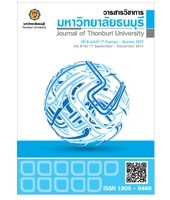การพัฒนารูปแบบสหกรณ์ตามแนวพุทธ
Keywords:
พุทธสหกรณ์, รูปแบบสหกรณ์ตามแนวพุทธ, สภาพสหกรณ์ในประเทศไทย, สหกรณ์และแนวคิดตามหลักพระพุทธศาสนา, Cooperatives Buddhism, Cooperatives Model Based on Buddhism Path, Cooperatives Status Thailand, Cooperatives and Buddhist PhilosophyAbstract
การวิจัยครั้งนี้มีวัตถุประสงค์ 3 ประการ ได้แก่ (1) เพื่อศึกษาแนวคิดเรื่องความสอดคล้องของหลักสหกรณ์กับพระพุทธศาสนา (2) เพื่อศึกษาสภาพของการสหกรณ์ในประเทศไทย (3) เพื่อพัฒนารูปแบบสหกรณ์ตามแนวพุทธ โดยศึกษาเชิงเอกสารและเชิงสำรวจจาก 2 กลุ่มเครื่องมือใช้แบบสอบถามและแบบสัมภาษณ์ ทำการวิเคราะห์ด้วยสถิติพรรณนาและการวิเคราะห์เนื้อหา
ผลการวิจัยพบว่า แนวคิดเรื่องสหกรณ์มีความสอดคล้องกับหลักพระพุทธศาสนา ในการมีส่วนร่วมที่พระพุทธเจ้าให้ความสำคัญเรื่องสามัคคีธรรมตามหลักสังคหวัตถุ 4 และเรื่องจาคะ การแบ่งปันตามหลักฆราวาสธรรม 4 เพื่อให้ถึงพร้อมประโยชน์แก่ตนเองและประโยชน์แก่ผู้อื่น
สภาพการสหกรณ์ในประเทศไทยมีจุดแข็งคือ มีระบบการดำเนินงานที่โปร่งใสตรวจสอบได้ มีจุดอ่อนคือสมาชิกขาดความรู้ความเข้าใจแนวคิด หลักการ และอุดมการณ์สหกรณ์อย่างแท้จริง แต่มีโอกาสได้รับการสนับสนุนจากส่วนงานราชการ และอุปสรรคจากธุรกิจที่มีการแข่งขันสูง การสังเคราะห์รูปแบบสหกรณ์ตามแนวพุทธโดยบูรณาการพบว่า ผลการพัฒนารูปแบบสหกรณ์ตามแนวพุทธ จากข้อมูลสามารถสังเคราะห์เป็นรูปแบบสหกรณ์ตามแนวพุทธประกอบด้วย 1) การนำสหกรณ์ตามแนวพุทธจากการกำหนดนโยบาย วัตถุประสงค์ ภารกิจและเป้าหมายสหกรณ์ที่สอดคล้องตามหลักพระพุทธศาสนา 2) การบริหารจัดการสหกรณ์ตามแนวพุทธ 3) คนสหกรณ์ตามแนวพุทธ การพัฒนารูปแบบสหกรณ์ตามแนวพุทธ ต้องเน้นการพัฒนาคนด้วยการส่งเสริมการเรียนรู้ตามกระบวนการพัฒนา 4 ระดับ เพื่อที่ทำให้คนสหกรณ์มีศรัทธา มีศีล มีจาคะ และเกิดปัญญา
A DEVELOPMENT OF COOPERATIVE MODEL BASED ON BUDDHISM PATH
This research aims to 1) study the concept of cooperatives and their relations to the Buddhist principles 2) study Thailand cooperative status and 3) develop cooperative standard in Buddhist principles. The researcher has been day through literature and every data from two different groups by questionnaire and interview process Data analysis used were descriptive statistics and subject analysis.
It was found that cooperative concepts are relevant to Buddhist principles particularly participation which Buddha focuses on the entity according to 4 Sangahavatthus, charity (Caga) and contribution (4 Gharavasa-dhammas) to benefit for self and others (Sadharanabhogita).
The analysis of Thailand cooperatives found that cooperative strength are the transparent operation and able to recheck, in contrast; the weakness is the member truly lack of knowledge in cooperative concept, principles and ideology. The opportunity is supported by officials and threat from business is highly competitive. Synthesizing integral Buddhist cooperative forms the cooperative model base on Buddhist concept which is 1) Cooperative on Buddhism path base on mission goals of policy objective in accordance with the cooperative principles. 2) The management of the cooperatives on Buddhism path. 3) Members cooperative on Buddhism path. Thus, the development of the cooperatives should be done according to the four levels so that the cooperatives people would have faith, discipline, sacrifice, hence, wisdom.







